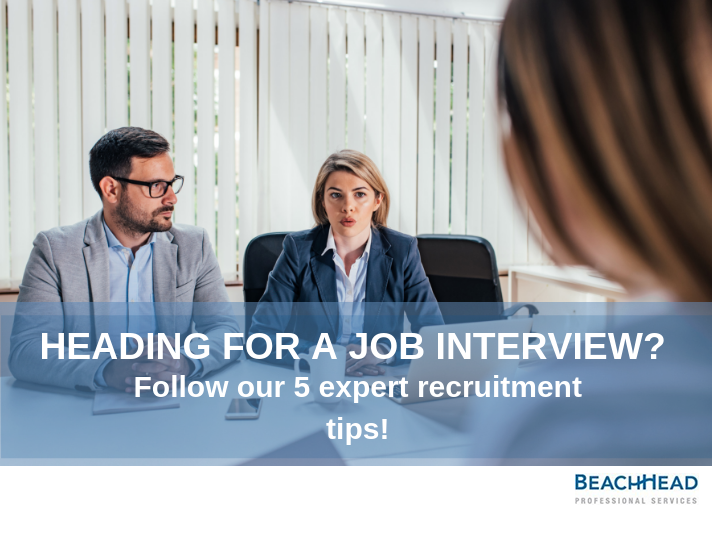Posted April 16, 2019
Heading for a job interview? Follow our 5 expert recruitment tips!
Finding a new role can be a challenging experience. From designing an impeccable resume to performing your best during an interview, there are many new situations which require some planning and focus. To help highlight your best qualities, we asked our recruiting experts to highlight some of the top professional traits hiring managers expect during job interviews. Read on to find out more about these and expert recruitment tips on how to execute them successfully.

“It is important for candidates to recognize problematic behavioral practices,” says Julanne Steele, the Managing Partner at BeachHead. “as they then can monitor their behavior during interviews, develop more effective behavior within interviews, and ultimately incorporate more effective techniques within the work environment”.
DRESS FOR SUCCESS
Whether you like it or not, the clothing you wear will provide an initial impression to the interviewer. The attire chosen sends signals about your professionalism, your work, and your attitude. Casual clothes project a casual first impression, not a professional one, so always dress in your formal work clothes.
While many companies are relaxing their dress codes, it is generally appropriate to wear formal work clothes to the interview, especially financial services. But because there are no hard and fast rules anymore, your top choice should be to follow the company culture. If checking the company’s website and social media pages don’t work, your best bet is speaking with the BeachHead Recruitment Team. Our recruitment experts can give you an insight into the company’s overall vibe and help you pick out the most suitable attire for an ideal first impression.
POSITIVE AND OPEN ATTITUDE
Once the initial impressions are done, it is now important to project a friendly attitude and be thoroughly professional from start to finish. Folded arms, short answers with a sharp tone of voice, eye-rolling are all signs of a negative attitude. Another bad attitude is arrogance, which candidates often confuse with confidence. You don’t want to come across as a know-it-all.
Walk into the interview with a mix of confidence, humility, and some enthusiasm. Avoid exaggerating your skills and bragging about your work. Don’t doubt your abilities as doing this might led the interviewer to pick up on the negative energy. Similarly, it is important to not bring any leftover hostility about your former employer and co-workers to the interview. Be as pleasant as you can during an interview, and you will stand out as someone who will work well with others, which is the ideal outcome that we desire.
THINK BEFORE YOU SPEAK
An interesting aspect of being human is that we can communicate our thoughts in real time. This gift of speaking, though a boon, can be a real curse during stressful situations, typically, job interviews. Before you jump in with an answer, it’s necessary to comprehend what the interviewer is asking fully.
What’s the trick? Well, it’s as easy as listening. Sit back and listen. Formulate your responses. Think about various options and consider different ways of saying them. Take a minute or two if you’d like. Your objective here should be to find the best answer and convey it to the interviewer in a way that has a positive impact. Make sure to combine your content with a fitting tone of voice, body and facial expressions to augment your conversation for a maximum impact.
BE COURTEOUS
It’s discourteous to interrupt someone while they are speaking. Any disruption to an interviewer is not just annoying, but also disturbs the flow of ideas, thus interrupting their “train of thought.” This behavior also indicates you would experience difficulty adhering to directions and that you may have a difficult personality. It depicts you as an individual who’s with no regard, judgment, or patience.
So, even if you don’t understand the question, listen through to the end, and then respond. Ask your questions only after the interviewer finishes talking. As well, it doesn’t matter if, halfway through their statement, you know the perfect response, wait until the end. In case if you do blurt something out and interrupt them, apologize. Be gracious and respectful. Simply put, treat the interviewer with respect and thoughtfulness, and those qualities will reflect onto you.
POSITIVE BODY LANGUAGE
Body language displayed during an interview can hold as much weight on the outcome as the display of your abilities and skill sets. The aim is to appear confident, but not obnoxious, and open to listening. Slouching or being too stiff, fidgeting, jingling your keys, shaking your leg, scratching your head, and crossing your arms should all be avoided during an interview.
The interviewer doesn’t know you. All they know is what you say and how you say it. So, the most critical thing is to pay attention to how you carry yourself in and out of that interview room. Hold your head up high, lean back in your seat, look the interviewer in the eye and smile. Lean in and appear animated while making a point, nod while listening and consciously use hand gestures to convey your ideas efficiently. Rest your hands on the table or lap while listening. Use your body language to communicate how excited you are for the role and, if hired, you’d be a great asset to the team.
CONCLUSION
First impressions are important, and if you come across poorly, it’s impossible to change them. Follow these practices, and we’re sure you would be well on your way to receiving that second interview call. Remember, nothing beats talent. Therefore, before you meet the hiring manager, make sure to hone both your technical and soft skills.
Ready for a new role? Send us your resume at info@beach-head.com and we will help. For more exciting tips and tricks remember to like us on Facebook and do follow us on Twitter and LinkedIn. Apply to all our latest job openings here.